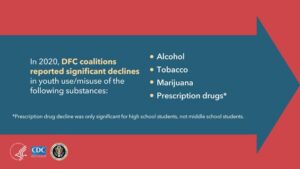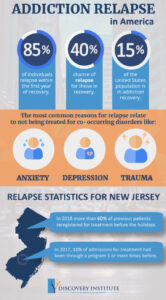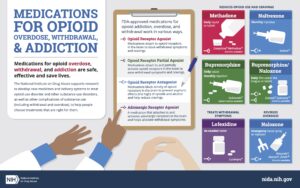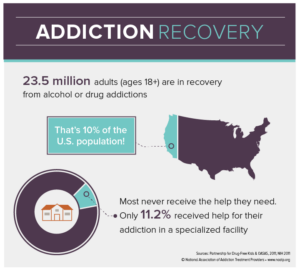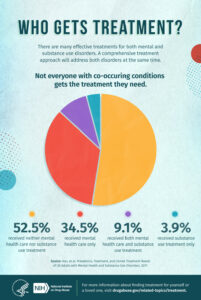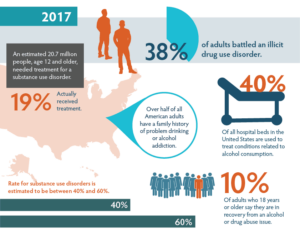Statistics on Addiction Treatment & Recovery in the United States
According to the National Institute on Alcohol Abuse and Alcoholism (NIAAA), research on the science of addiction and the treatment of substance use disorders has led to the development of research-based methods that help people to achieve and maintain remission from substance use disorder and cessation from heavy use allowing them to resume fulfilling lives, also known as being in recovery. 1
Like other chronic diseases such as heart disease or asthma, treatment for drug addiction usually isn’t a cure. But addiction can be managed successfully. Treatment enables people to counteract addiction’s disruptive effects on their brain and behavior and regain control of their lives.
Given that addiction can impact various facets of an individual’s life, effective treatment should consider the overall well-being of the person. Counselors can choose from a range of services that cater to the individual’s medical, mental, social, work-related, familial, and legal requirements, all of which contribute to their recovery process.2
Medications & Devices
Different types of medications may be useful at different stages of treatment to help a patient stop abusing drugs, stay in treatment, and avoid relapse.2
- Treating withdrawal. When individuals initially cease drug use, they might undergo a mix of physical and emotional symptoms like restlessness, sleep issues, and feelings of depression or anxiety, among other mental health challenges. Specific treatment medications and tools are designed to alleviate these symptoms, facilitating the process of quitting drug use.
- Staying in treatment. Certain treatment medications and mobile apps are employed to assist the brain in gradually adjusting to the absence of the drug. These treatments work gradually to curb drug cravings and promote a calming influence on bodily functions. This support can aid patients in concentrating on counseling and other therapeutic approaches linked to their drug treatment.
- Preventing relapse. Scientific research has revealed that stress-related cues associated with drug use, including people, environments, objects, and emotional states, as well as exposure to drugs, are the primary triggers for relapse. Scientists have been working on therapies to disrupt these triggers, aiming to assist patients in maintaining their recovery journey.
Behavioral Therapy
Behavioral therapies can be used in helping individuals undergoing drug addiction treatment to transform their perspectives and behaviors associated with drug use. This empowers patients to effectively manage stressful situations and potential triggers that could lead to relapse. Additionally, behavioral therapies can work with medications, boosting their efficacy, and help people remain in treatment longer. 2
- Cognitive-behavioral therapy seeks to help patients recognize, avoid, and cope with the situations in which they’re most likely to use drugs.
- Contingency management uses positive reinforcement such as providing rewards or privileges for remaining drugfree, for attending and participating in counseling sessions, or for taking treatment medications as prescribed.
- Motivational enhancement therapy uses strategies to make the most of people’s readiness to change their behavior and enter treatment.
- Family therapy helps people (especially young people) with drug use problems, as well as their families, address influences on drug use patterns and improve overall family functioning.
- Twelve-step facilitation (TSF) is an individual therapy typically delivered in 12 weekly sessions to prepare people to become engaged in 12-step mutual support programs. 12-step programs, like Alcoholic Anonymous, are not medical treatments, but provide social and complementary support to those treatments. TSF follows the 12-step themes of acceptance, surrender, and active involvement in recovery.
For more information, please visit: NIDA: Treatment and Recovery
1 https://www.niaaa.nih.gov/research/niaaa-recovery-from-alcohol-use-disorder/definitions
2NIDA. 2023, March 9. Treatment and Recovery. Retrieved from https://nida.nih.gov/publications/drugs-brains-behavior-science-addiction/treatment-recovery


